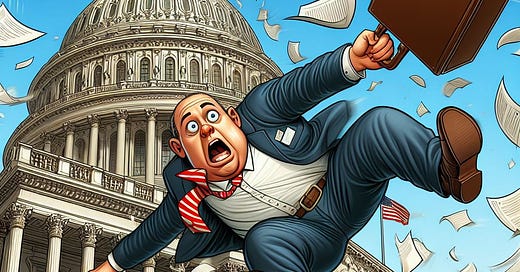Why does anyone run for Congress?
And sundry interesting things about our nation's legislature.
I posted a few new items at UnderstandingCongress.org.
Dr. John Haskell, formerly an executive at the Congressional Research Service and the Library of Congress’s Kluge Center, revists Alan Ehrenhalt’s book, The United States of Ambition. So, why does anyone run for Congress? Certainly, it is not for the pay, Haskell observes… (Read more)
I rediscovered a video of Prof. Matt Green describing what he and Prof. Douglas Harris learned about who tends to win races for the Speakership of the House of Representatives.
Thanks to Rep. Marjorie Taylor Green, I felt the need to post a primer titled, “What is the motion to vacate the Speaker of the House of Representatives?” She and a handful of other House GOP legislators apparently believe that shutting down the federal government is a great way to force the Democrat-held enate and White House to agree to lower federal spending. That so many of their colleagues disagree is telling.
Here are a few things that caught my eye and might be of interest to you:
PunchBowlNews produced a list of legislators who voted against the spending bills after haggling to insert community project grants (AKA earmarks) into them. They knew the bill would pass, so they voted symbolically to send signals to their voters and to hedge against electoral risk. “Take the dough and vote no” is a rational strategy, but one wonders how long voters will fall for it.
My colleague Philip Wallach has a new white paper out: Picking the Wrong Fights: Why We Must Fix Our Broken Budget Process. Phil writes: “Year after year, the US budgetary regime proves incapable of focusing legislators’ attention on the biggest drivers of federal deficits. And so Americans have seen a sustained failure to alter the alarming upward trajectory of the country’s debt….The problem is not, as some conservatives contend, that lawmakers have failed to heed the advice of would-be cutters. Rather, the current system channels criticism of debt accumulation into fights over discretionary spending, which now represents less than a third of total federal spending.”
Stephen Weissman’s book, From the Congo to Capitol Hill. Here’s the jacket description: “A young American professor is caught up in a racially fraught crisis at an American White missionary-led university in the Congo and is publicly fired. Several years later, he becomes a key staff aide for a congressional committee battling to distance the U.S. government from the Congo dictator’s human rights and corruption abuses. His interconnected experiences in these two fascinating places provide first hand insights into some of today’s burning issues: the dynamics of racial conflict, the paranoia of authoritarian regimes and the hidden dysfunctions of the U.S. Congress (including corrupting relationships with narrow-based domestic and foreign lobbyists), the State Department (truth-shading and short-term thinking) and the pundit press.”
Two long-time Capitol Hill hands, Mike Johnson and Jerome Climer, have a new book out: Fixing Congress: Restoring Power to the People. I am eager to read my copy as both these gents have been involved with and studying Congress for decades.
Forty-five years ago, C-SPAN began broadcasting proceedings from the Cpaitol. Don Wolfensberger tells about how that came to be in The Hill.
If you find this Substack useful, please share it!




Having been a Republican field operative for US House and Senate campaigns during the 1980's recruiting candidates was tough then - I can only imagine what it would be like today. It is reflected in what I consider a noticeable decline in the "quality" of representation we see in Congress. That's subjective, but as the late Justice Potter Stewart said about porn, I know it when I see it.